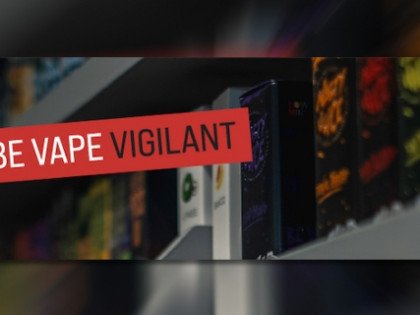Surgeon General Vivek Murthy opens up with: “Preventing tobacco use in any form among youth and young adults is critical to ending the tobacco epidemic in the United States.” His report is being described as both 'definitive' and 'ridiculous', depending on whom you consult. No prizes for guessing the response from harm reduction advocates and vaping aficionados.
“These products are now the most commonly used form of tobacco among youth in the United States, surpassing conventional tobacco products, including cigarettes, cigars, chewing tobacco, and hookahs,” Murthy adds, happily lying about the truth that there’s no tobacco in eliquid.
Writing in the foreword, Centres for Disease Control and Prevention’s (CDC) director Thomas Frieden repeats his tired claims: “[Ecig] companies are promoting their products through television and radio advertisements that use celebrities, sexual content, and claims of independence to glamorize these addictive products and make them appealing to young people.”
And why should people fear vape products? Well, there’s the claimed harm to the developing brain for one. At which point Clive Bates, harm reduction advocate, chimes in: “If that is the case, where are the smokers with brain damage? On what basis is it possible to claim any material risk to bystanders from second-hand vapor exposure? The report treats vaping as if it is a new and additional phenomenon in isolation, rather than a young person might be benefiting from vaping instead of smoking. This, the surgeon general has crossed the boundary between science and propaganda.”
The report was released at a press conference in conjunction with the launch of yet another website. The website hopes to educate the public by informing them about “the fact”, “the risks” and how to “take action”. Facts include the amazing insight that 85% of vapers use flavours…but doesn’t explain who the people are who vape plain PG/VG mixes.
It matters not to American Academy of Paediatrics’ Benard Dreyer, who represents an organisation bent on crushing vaping in favour of Big Pharma’s failing alternatives. “E-cigarette use has raised alarm among pediatricians tremendously,” Dreyer said. “That’s why this report is so necessary and welcome at this time, because, as you’ve heard, e-cigarettes have the potential to addict the next generation of children. It’s a major public health crisis, as far as we’re concerned.”
The great and the good stand in line behind this ideological onslaught on harm reduction. Sylvia Burwell, the US Department of Health and Human Services secretary, said: “The findings from this report reinforce the need to support evidence-based programs to prevent youth and young adults from using tobacco in any form, including e-cigarettes. The health and wellbeing of our nation’s young people depend on it.”
The problem is that the findings are based on flawed research, bias researchers and the hefty support of the pharmaceutical dollar. We have featured repeated stories on POTV about the reprehensible skew the likes of the American Academy of Paediatrics have placed on results, bordering on abject incompetence if not criminal fabrication.
Although one wouldn’t expect ASH UK to use such language, they come close when expressing their confusion over the report’s concerns over teens being trapped into smoking: “While nicotine is not completely harmless, it is smoking that is lethal. In the UK we have a regulatory system that restricts advertising and controls sales to young people. There is no evidence of significant regular use by non-smoking children and, as in the US, smoking rates are going down, not up. In the US as in the UK, young people are experimenting with e-cigarettes but vaping has not been associated with an increase in smoking, a point which is not made sufficiently clear in the report.”
There is also the minor problem of vaping being a shrinking market and not the ever-expanding monster anti-ecig campaigners claim it to be. Nielsen market research reported estimated USA sales approaching $3.5 Billion, although, this year, we have covered reports from retail trade bodies that sales are slumping markedly. The impact of media lies, ‘expert’ fear-mongering and restrictive legislation is already having an impact on vaping and looks set to continue into 2017.
Professor John Britton shares ASH’s bemusement: “Evidence from the US is the same as in the UK in crucial respects: Children experimenting with e-cigarettes are by and large those who are already experimenting with cigarettes or are smokers.” And, referring to the massive drop in smoking this year, “It is falling fast in the UK, almost certainly related to e-cigarettes.”
Kevin Fenton, national director of health and wellbeing at Public Health England, is also at a loss to explain where the surgeon general and the CDC’s fears are rooted: “Our review of the evidence found e-cigarette use carries a fraction of the risk of smoking, a conclusion reiterated by the Royal College of Physicians earlier this year. No new evidence has been published to contradict this, however we are closely monitoring any emerging evidence.”
David Sweanor, never one to hold back his opinions on harm reduction, considers the report to be very biased: “The report shows the way the CDC has diverged from science to ideology. The fact that the prestigious Royal College of Physicians was totally ignored by the surgeon general is a real indictment of the CDC. The CDC and surgeon general are picking evidence that fits their agenda rather than basing their agenda on good science.”
None of the sensible opinions expressed on the matter are important for mainstream American media, nor for the wealth of university employees desperate for attention. Georgia State was one of the fastest to tout the services of its pharma shill in case any newspaper wanted a quote. One that will be the polar opposite of Dr. Joel Nitzkin’s in The Spectator: “These findings, which are contained within the report, directly conflict the conclusion that e-cigs are a threat. In fact, the data strongly suggest that e-cigs may be the most effective means ever tried to reduce smoking and smoking-related addiction, illness and death in the United States.”
The truth about this report is that it offers nothing but a continuance of the anti-harm reduction propaganda war, begun in California, continued by the CDC, and funded by pharmaceutical companies. “The report is filled with claims about harm, while there are no real facts about any harm caused by e-cigarettes to anyone (user or bystander),” writes Konstantinos Farsalinos. “The statements about harmful and potentially harmful compounds are nothing more than emotional statements with no real content in terms of realistic risk.”
“In all the statements related to e-cigarettes and harm, you can easily substitute the term ‘e-cigarette’ with terms like ‘human breath’ (it does emit potentially harmful aldehydes), ‘indoor air’ (you are probably exposed to more formaldehyde by just staying at home compared to vaping), ‘walking on the streets’, ‘medications’ (I am not aware of any medication without side effects or any medical intervention without potential complications), or anything you can imagine.
Ultimately, the report can be summed up as follows: it’s totally 2016.
Dave Cross
Journalist at POTVDave is a freelance writer; with articles on music, motorbikes, football, pop-science, vaping and tobacco harm reduction in Sounds, Melody Maker, UBG, AWoL, Bike, When Saturday Comes, Vape News Magazine, and syndicated across the Johnston Press group. He was published in an anthology of “Greatest Football Writing”, but still believes this was a mistake. Dave contributes sketches to comedy shows and used to co-host a radio sketch show. He’s worked with numerous start-ups to develop content for their websites.
Join the discussion
Be Vape Vigilant Success
The ‘Be Vape Vigilant’ national initiative has exposed more than 100 potential rogue vape traders says the UK Vaping Industry Association
The COP10 Scorecard
Dr Derek Yach and Tobacco Harm Reduction.net have released a COP10 Scorecard report, drawing upon recent World Health Organization (WHO) reports to assess progress made by Parties to the Framework Convention on Tobacco Control (FCTC)
A Manifesto for Smokefree Beginnings
The Smoking in Pregnancy Challenge Group has produced its fourth national report: “A Manifesto for Smokefree Beginnings”
European Parliament Endorses Smoking Cessation Tool
The European Parliament has endorsed vaping as a smoking cessation tool via its Subcommittee on Public Health, according to the World Vapers’ Alliance






-listing400.jpg)




